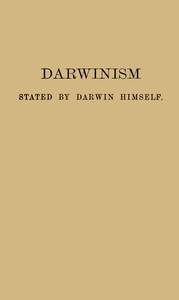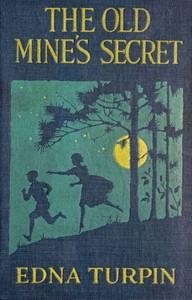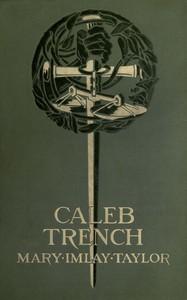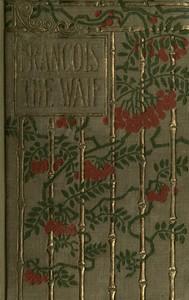|
|
Read this ebook for free! No credit card needed, absolutely nothing to pay.Words: 79753 in 20 pages
This is an ebook sharing website. You can read the uploaded ebooks for free here. No credit cards needed, nothing to pay. If you want to own a digital copy of the ebook, or want to read offline with your favorite ebook-reader, then you can choose to buy and download the ebook.

: Darwinism stated by Darwin himself Characteristic passages from the writings of Charles Darwin by Darwin Charles Sheppard Nathan Compiler - Evolution (Biology)@FreeBooksThu 08 Jun, 2023 pted to attribute their proportional numbers and kinds to what we call chance. But how false a view is this! Every one has heard that, when an American forest is cut down, a very different vegetation springs up; but it has been observed that ancient Indian ruins in the Southern United States, which must formerly have been cleared of trees, now display the same beautiful diversity and proportion of kinds as in the surrounding virgin forest. What a struggle must have gone on during long centuries between the several kinds of trees, each annually scattering its seeds by the thousand; what war between insect and insect--between insects, snails, and other animals with birds and beasts of prey--all striving to increase, all feeding on each other, or on the trees, their seeds and seedlings, or on the other plants which first clothed the ground and thus checked the growth of the trees! Throw up a handful of feathers, and all fall to the ground according to definite laws; but how simple is the problem where each shall fall compared to that of the action and reaction of the innumerable plants and animals which have determined, in the course of centuries, the proportional numbers and kinds of trees now growing on the old Indian ruins! It is good thus to try in imagination to give to any one species an advantage over another. Probably in no single instance should we know what to do. This ought to convince us of our ignorance on the mutual relations of all organic beings--a conviction as necessary as it is difficult to acquire. All that we can do is to keep steadily in mind that each organic being is striving to increase in a geometrical ratio; that each at some period of its life, during some season of the year, during each generation or at intervals, has to struggle for life and to suffer great destruction. When we reflect on this struggle, we may console ourselves with the full belief that the war of nature is not incessant, that no fear is felt, that death is generally prompt, and that the vigorous, the healthy, and the happy survive and multiply. NATURAL SELECTION: OR, THE SURVIVAL OF THE FITTEST. The preservation, during the battle for life, of varieties which possess any advantage in structure, constitution, or instinct, I have called Natural Selection; and Mr. Herbert Spencer has well expressed the same idea by the Survival of the Fittest. The term "natural selection" is in some respects a bad one, as it seems to imply conscious choice; but this will be disregarded after a little familiarity. No one objects to chemists speaking of "elective affinity"; and certainly an acid has no more choice in combining with a base than the conditions of life have in determining whether or not a new form be selected or preserved. The term is so far a good one as it brings into connection the production of domestic races by man's power of selection and the natural preservation of varieties and species in a state of nature. For brevity sake I sometimes speak of natural selection as an intelligent power; in the same way as astronomers speak of the attraction of gravity as ruling the movements of the planets, or as agriculturists speak of man making domestic races by his power of selection. In the one case, as in the other, selection does nothing without variability, and this depends in some manner on the action of the surrounding circumstances in the organism. I have, also, often personified the word Nature; for I have found it difficult to avoid this ambiguity; but I mean by nature only the aggregate action and product of many natural laws, and by laws only the ascertained sequence of events. AN INVENTED HYPOTHESIS. In scientific investigations it is permitted to invent any hypothesis, and if it explains various large and independent classes of facts it rises to the rank of a well-grounded theory. The undulations of the ether and even its existence are hypothetical, yet every one now admits the undulatory theory of light. The principle of natural selection may be looked at as a mere hypothesis, but rendered in some degree probable by what we positively know of the variability of organic beings in a state of nature--by what we positively know of the struggle for existence, and the consequent almost inevitable preservation of favorable variations--and from the analogical formation of domestic races. Now, this hypothesis may be tested--and this seems to me the only fair and legitimate manner of considering the whole question--by trying whether it explains several large and independent classes of facts; such as the geological succession of organic beings, their distribution in past and present times, and their mutual affinities and homologies. If the principle of natural selection does explain these and other large bodies of facts, it ought to be received. On the ordinary view of each species having been independently created, we gain no scientific explanation of any one of these facts. We can only say that it has so pleased the Creator to command that the past and present inhabitants of the world should appear in a certain order and in certain areas; that he has impressed on them the most extraordinary resemblances, and has classed them in groups subordinate to groups. But by such statements we gain no new knowledge; we do not connect together facts and laws; we explain nothing. These facts have as yet received no explanation on the theory of independent creation; they can not be grouped together under one point of view, but each has to be considered as an ultimate fact. As the first origin of life on this earth, as well as the continued life of each individual, is at present quite beyond the scope of science, I do not wish to lay much stress on the greater simplicity of the view of a few forms or of only one form having been originally created, instead of innumerable miraculous creations having been necessary at innumerable periods; though this more simple view accords well with Maupertuis's philosophical axiom of "least action." HOW FAR THE THEORY MAY BE EXTENDED. In considering how far the theory of natural selection may be extended--that is, in determining from how many progenitors the inhabitants of the world have descended--we may conclude that at least all the members of the same class have descended from a single ancestor. A number of organic beings are included in the same class, because they present, independently of their habits of life, the same fundamental type of structure, and because they graduate into each other. Moreover, members of the same class can in most cases be shown to be closely alike at an early embryonic age. These facts can be explained on the belief of their descent from a common form; therefore it may be safely admitted that all the members of the same class are descended from one progenitor. But as the members of quite distinct classes have something in common in structure and much in common in constitution, analogy would lead us one step further, and to infer as probable that all living creatures are descended from a single prototype. Thus a large yet undefined extension may safely be given to the direct and indirect results of natural selection; but I now admit, after reading the essay by N?geli on plants, and the remarks by various authors with respect to animals, more especially those recently made by Professor Broca, that in the earlier editions of my "Origin of Species" I perhaps attributed too much to the action of natural selection or the survival of the fittest. I have altered the fifth edition of the "Origin" so as to confine my remarks to adaptive changes of structure; but I am convinced, from the light gained during even the last few years, that very many structures which now appear to us useless will hereafter be proved to be useful, and will therefore come within the range of natural selection. Nevertheless, I did not formerly consider sufficiently the existence of structures, which, as far as we can at present judge, are neither beneficial nor injurious; and this I believe to be one of the greatest oversights as yet detected in my work. I may be permitted to say, as some excuse, that I had two distinct objects in view: firstly, to show that species had not been separately created; and, secondly, that natural selection had been the chief agent of change, though largely aided by the inherited effects of habit, and slightly by the direct action of the surrounding conditions. I was not, however, able to annul the influence of my former belief, then almost universal, that each species had been purposely created; and this led to my tacit assumption that every detail of structure, excepting rudiments, was of some special, though unrecognized, service. Any one with this assumption in his mind would naturally extend too far the action of natural selection, either during past or present times. Some of those who admit the principle of evolution, but reject natural selection, seem to forget, when criticising my book, that I had the above two objects in view; hence if I have erred in giving to natural selection great power, which I am very far from admitting, or in having exaggerated its power, which is in itself probable, I have at least, as I hope, done good service in aiding to overthrow the dogma of separate creations. IS THERE ANY LIMIT TO WHAT SELECTION CAN EFFECT? The foregoing discussion naturally leads to the question, What is the limit to the possible amount of variation in any part or quality, and, consequently, is there any limit to what selection can effect? Will a race-horse ever be reared fleeter than Eclipse? Can our prize cattle and sheep be still further improved? Will a gooseberry ever weigh more than that produced by "London" in 1852? Will the beet-root in France yield a greater percentage of sugar? Will future varieties of wheat and other grain produce heavier crops than our present varieties? These questions can not be positively answered; but it is certain that we ought to be cautious in answering them by a negative. In some lines of variation the limit has probably been reached. Youatt believes that the reduction of bone in some of our sheep has already been carried so far that it entails great delicacy of constitution. Free books android app tbrJar TBR JAR Read Free books online gutenberg More posts by @FreeBooks
: The old mine's secret by Turpin Edna Henry Lee Wright George Illustrator - World War 1914-1918 United States Juvenile fiction; Families Juvenile fiction; Virginia Juvenile fiction@FreeBooksThu 08 Jun, 2023

: Caleb Trench by Taylor Mary Imlay McConnell Emlen Illustrator - Love stories; Political fiction; Southern States Fiction@FreeBooksThu 08 Jun, 2023
|
Terms of Use Stock Market News! © gutenberg.org.in2025 All Rights reserved.






